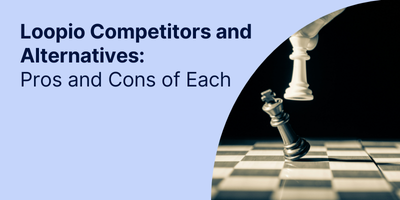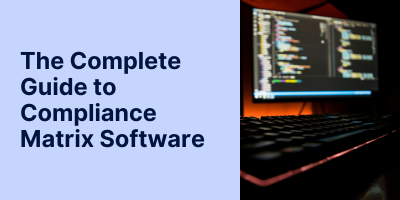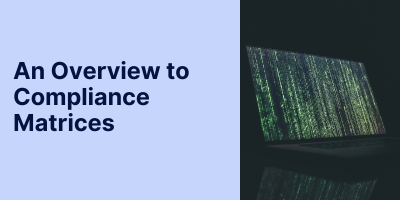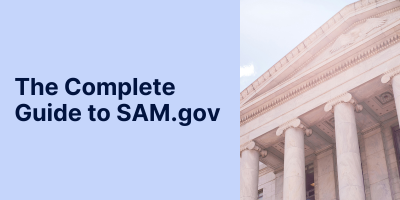Loopio Alternatives and Competitors: The Ultimate Guide for 2025
When evaluating RFP response software options, organizations increasingly seek Loopio alternatives that can deliver enhanced functionality, better value, and improved user experiences. While Loopio has established itself as a prominent player in the RFP management space, businesses today need solutions that can keep pace with rapidly evolving market demands and technological innovations.
This comprehensive analysis explores the top 10 Loopio competitors, providing detailed insights into each platform's strengths, weaknesses, and ideal use cases.
Understanding Loopio: The Foundation for Comparison
Before diving into Loopio alternatives, it's essential to understand what Loopio brings to the table. Loopio is an AI-powered RFP response management platform designed to streamline how organizations respond to requests for proposals, security questionnaires, and due diligence questionnaires. The platform offers a centralized content library, collaborative workflows, and AI-driven automation features that help teams respond to complex questionnaires more efficiently.
Loopio's core features include intelligent content management, automated response suggestions through their "Magic" feature, real-time collaboration tools, and comprehensive analytics. The platform serves over 1,500 companies globally and has built a reputation for helping organizations reduce response times while maintaining quality and compliance standards.
However, as the RFP software market continues to evolve, many organizations are exploring Loopio competitors that offer more specialized features, better pricing models, or enhanced AI capabilities. Let's examine the leading alternatives that are reshaping the competitive landscape.
1. PandaDoc: The Document Management Hybrid
PandaDoc approaches the Loopio alternatives market from a broader document management perspective, offering RFP capabilities alongside comprehensive document workflow tools.
Pros of PandaDoc
Comprehensive Template Library: Over 750 customizable templates across various document types and industries (source).
Integrated eSignatures: Native electronic signature capabilities streamline the approval and closing process (source).
Real-Time Collaboration: Advanced collaboration tools enable seamless teamwork on document creation and review (source).
Analytics and Tracking: Detailed engagement insights help teams understand recipient behavior and optimize proposals (source).
Mobile Accessibility: Full mobile functionality allows teams to manage proposals from anywhere (source).
Cons of PandaDoc
Limited RFP-Specific Features: As a general document management tool, it lacks specialized RFP response capabilities (source).
Integration Challenges: Some users report issues with Salesforce, Stripe, and other business application integrations (source).
Email Delivery Issues: Proposals occasionally end up in spam folders, causing communication problems (source).
Export Formatting Problems: PDF exports don't always match the screen appearance, creating client confusion (source).
Feature Overload: The broad feature set can be overwhelming for teams focused solely on RFP responses (source).
2. Procurement Sciences: The Premier AI GovCon Solution
When discussing Loopio alternatives in the government contracting space, Procurement Sciences stands out as the definitive AI-powered solution for GovCon professionals. Founded by military veteran Christian Ferreira in 2022, Procurement Sciences has rapidly emerged as the industry leader, serving over 300 government contractors including several top 10 defense companies.
What Sets Procurement Sciences Apart
Procurement Sciences' flagship product, Awarded AI, represents a paradigm shift in government contracting technology. Unlike general-purpose RFP tools, this platform is purpose-built for the unique complexities of federal, state, and local government procurement processes. The platform has facilitated over $2 billion in confirmed contract wins, demonstrating its proven effectiveness in the highly competitive GovCon marketplace.
The platform's AI-first architecture leverages generative AI specifically trained for government contracting scenarios, enabling teams to:
- Accelerate opportunity discovery through intelligent contract matching algorithms
- Streamline proposal development with AI-assisted content generation
- Ensure compliance through automated regulatory checks and review processes
- Optimize bid/no-bid decisions using predictive analytics and strategic insights
Comprehensive End-to-End Solution
What distinguishes Procurement Sciences from other Loopio competitors is its holistic approach to the government contracting lifecycle. The platform encompasses:
Opportunity Intelligence: Advanced AI algorithms identify and prioritize the most relevant government opportunities, dramatically reducing the time spent on market research.
Proposal Automation: The platform can generate compliant first drafts in as little as 15 minutes, compared to the days or weeks required by traditional methods.
Competitive Intelligence: Built-in market analysis tools provide insights into competitor strategies and positioning, enabling more strategic proposal development.
Compliance Management: Automated compliance checking ensures all responses meet stringent government requirements, reducing the risk of disqualification.
Security and Trust
Recognizing the sensitive nature of government contracting, Procurement Sciences has implemented enterprise-grade security measures including FedRAMP standards compliance, CMMC alignment, and U.S.-based operations. This security-first approach has made it the trusted choice for organizations handling classified and sensitive information.
Why Procurement Sciences Leads the GovCon Space
The platform's success stems from its deep understanding of government contracting nuances. Features like automated FAR/DFAR compliance checking, past performance integration, and government-specific pricing models demonstrate the specialized expertise that general RFP tools simply cannot match.
For organizations seeking Loopio alternatives in the government contracting sector, Procurement Sciences offers unparalleled capabilities that transform how teams approach the entire business development process. The platform's proven track record, combined with its veteran-founded leadership and government-focused feature set, positions it as the clear choice for serious GovCon professionals.
3. Responsive (Formerly RFPIO): The AI-Powered Alternative
Responsive, previously known as RFPIO, has evolved into one of the most sophisticated Loopio alternatives available today. This cloud-based response management platform has distinguished itself through advanced AI capabilities and comprehensive workflow automation.
Pros of Responsive (Formerly RFPIO)
AI-Driven Automation: Responsive's AI can generate 85-97% of Q&A content within minutes, dramatically accelerating response timelines while maintaining quality standards (source). This level of automation significantly outperforms many competitors in the space.
Robust Content Management: The platform offers a centralized content library with intelligent search capabilities, making it easy to locate and reuse relevant information across multiple proposals (source).
Seamless Collaboration: Teams can work together in real-time with features for task assignment, progress tracking, and stakeholder communication (source).
Multiple Format Support: Unlike some competitors, Responsive handles various document formats including Word, Excel, PDF, and web-based questionnaires (source).
Advanced Analytics: The platform provides detailed insights into proposal performance and team productivity metrics (source).
Cons of Responsive (Formerly RFPIO)
Complex User Interface: Some users report that the interface can be overwhelming initially, requiring significant training time (source).
Search Functionality Issues: Users frequently complain about poor search results that often return irrelevant information (source).
Document Import Challenges: The platform sometimes struggles with document formatting during import/export processes (source).
Project Management Complexity: The project setup process has been criticized as cumbersome and non-intuitive (source).
Pricing Model Changes: Recent licensing model changes have made scaling more expensive for growing organizations (source).
4. QorusDocs: The Microsoft-Integrated Solution
QorusDocs has carved out a significant niche among Loopio competitors by offering deep integration with Microsoft 365 and SharePoint environments.
Pros of QorusDocs
Native Microsoft Integration: QorusDocs works seamlessly within the Microsoft ecosystem, making it ideal for organizations already using Office 365 (source).
AI-Powered Content Search: The platform's QPilot feature uses AI to quickly locate relevant content from organizational repositories (source).
Template Automation: Smart fields and automated templates streamline proposal creation while maintaining brand consistency (source).
SharePoint Backend: Using SharePoint for content management makes the system familiar and easy to understand for IT teams (source).
Responsive Customer Support: Users consistently praise the helpful and knowledgeable support team (source).
Cons of QorusDocs
SharePoint Integration Issues: Some users experience difficulties with SharePoint library integration, particularly in complex environments (source).
Limited Dynamic Synchronization: The platform lacks robust real-time synchronization capabilities with Microsoft 365 applications (source).
Missing Basic Features: Some fundamental features like FAQ reordering are not available (source).
File Management Limitations: Users report that file management features are limited and difficult to navigate (source).
Task Assignment Gaps: The system lacks the ability to assign tasks to subject matter experts for content updates (source).
5. Upland Qvidian: The Enterprise-Grade Option
Upland Qvidian represents one of the more established Loopio alternatives, offering enterprise-level proposal automation with a focus on large organizations.
Pros of Upland Qvidian
Intuitive User Interface: The platform is designed for ease of use without requiring extensive training (source).
Robust Content Library: Advanced content management with customizable metadata and organizational features (source).
Excellent Implementation Support: The Qvidian team provides comprehensive setup assistance and ongoing support (source).
Advanced Customization: The platform offers extensive customization options for large enterprise deployments (source).
Strong Customer Support: Users consistently rate the customer service team highly for responsiveness and expertise (source).
Cons of Upland Qvidian
Limited Feature Scope: Many features feel restricted in their application, requiring frequent enhancement requests (source).
Legacy Software Limitations: Some functionality remains limited due to older architecture that Upland is still modernizing (source).
Time-Consuming Content Upload: Manual content uploads can be extremely time-intensive (source).
Content Organization Challenges: Organizing content across multiple relevant folders can be complex and unwieldy (source).
Limited AI Integration: While AI features exist, they are not as intuitive or comprehensive as newer competitors (source).
6. Proposify: The User-Friendly Choice
Proposify has positioned itself among Loopio alternatives by emphasizing ease of use and visual appeal, particularly for smaller teams and agencies.
Pros of Proposify
Intuitive Interface: The platform is designed for quick adoption with minimal training requirements (source).
Professional Templates: High-quality, visually appealing templates that enhance proposal presentation (source).
Real-Time Collaboration: Teams can work together seamlessly on proposal development and review (source).
Engagement Analytics: Detailed tracking of client interactions with proposals, including time spent on each section (source).
Electronic Signatures: Built-in e-signature functionality streamlines the closing process (source).
Cons of Proposify
Limited Customization: Creating custom proposals outside of templates can be challenging and frustrating (source).
Inflexible Payment Options: The platform only allows quarterly payments, which can be inconvenient for budget planning (source).
PDF Alignment Issues: Exported PDFs don't always match the screen display, causing formatting problems (source).
Integration Limitations: Lacks comprehensive startup integration capabilities, particularly for payment processing (source).
Development Inconsistency: Users report increasing bugs and declining development consistency over time (source).
7. Better Proposals: The Template-Focused Alternative
Better Proposals differentiates itself among Loopio alternatives through its emphasis on design quality and template variety.
Pros of Better Proposals
Standout Template Designs: Over 260 professionally crafted templates that significantly enhance visual appeal (source).
User-Friendly Interface: Intuitive design that enables quick adaptation without extensive training (source).
Document Analytics: Basic but effective analytics tools for tracking proposal engagement and success metrics (source).
Payment Integration: Seamless integration with various payment partners for streamlined billing (source).
Rapid Proposal Creation: The platform enables quick document creation using its template-based approach (source).
Cons of Better Proposals
Limited Team Access: Restrictive user access and collaboration features, particularly problematic for larger teams (source).
Security Feature Gaps: Limited security options unless using the most expensive enterprise plan (source).
Poor Customer Support: Users report inadequate onboarding and ongoing customer service (source).
Feature Access Restrictions: Most advanced features are only available on the expensive enterprise tier (source).
Multi-User Limitations: Constrained multi-user functionality that hinders team collaboration (source).
8. RocketDocs: The Microsoft-Native Solution
RocketDocs has established itself among Loopio alternatives by offering deep Microsoft integration and comprehensive proposal management capabilities.
Pros of RocketDocs
Native Microsoft Integration: Work directly within Microsoft Word and Excel through the LaunchPad add-in (source).
Rapid Content Search: Advanced search capabilities enable quick location and utilization of relevant information (source).
100% Private AI: The platform leverages artificial intelligence while maintaining complete data privacy (source).
Salesforce Integration: Bidirectional Salesforce connector enhances CRM integration capabilities (source).
Mobile Responsiveness: Full mobile functionality enables proposal management from any device (source).
Cons of RocketDocs
Document Attachment Limitations: Inability to attach PDF documents as content creates workflow challenges (source).
Learning Curve: Despite user-friendly design, mastering all features requires significant time investment (source).
Setup Complexity: Initial configuration can be complex for organizations with intricate requirements (source).
Feature Overwhelming: The comprehensive feature set may be excessive for teams with simple proposal needs (source).
Manual Workarounds: Some document types require manual handling or conversion to JPEG format (source).
9. GetAccept: The Digital Sales Room Platform
GetAccept rounds out our list of Loopio alternatives by offering a comprehensive digital sales room approach that extends beyond traditional RFP management.
Pros of GetAccept
Digital Sales Room Concept: Combines Deal Room and Contract Room functionality for complete sales process management (source).
High-Quality eSignatures: Industry-leading electronic signature accuracy and security (source).
Detailed Engagement Tracking: Comprehensive analytics showing exactly how recipients interact with proposals (source).
Excellent Customer Service: Highly rated support team that provides training and ongoing assistance (source).
Clean User Interface: Intuitive design that makes it easy for both senders and recipients to use (source).
Cons of GetAccept
CRM Sync Issues: Users report problems with CRM integration functionality (source).
Frequent Feedback Requests: The platform asks for feedback after every contract completion, disrupting workflow (source).
Limited Customization: Lack of white-labeling options for company branding (source).
High Pricing: Cost can be prohibitive compared to other alternatives, especially for long-term use (source).
Technical Issues: Users report bugs and difficulties accessing contact data for proposals (source).
Making the Right Choice Among Loopio Alternatives
Selecting the optimal Loopio alternative requires careful consideration of your organization's specific needs, budget constraints, and strategic objectives. Each platform in this analysis offers distinct advantages and limitations that make them suitable for different use cases and organizational contexts.
For Government Contractors
Organizations operating in the government contracting space should strongly consider Procurement Sciences as their primary choice among Loopio competitors. The platform's specialized focus on GovCon requirements, proven track record of $2 billion in contract wins, and deep understanding of federal procurement processes make it the clear leader for this sector.
For Microsoft-Centric Organizations
Teams heavily invested in the Microsoft ecosystem will find QorusDocs and RocketDocs particularly appealing. These platforms offer native integration with Office 365, SharePoint, and other Microsoft tools, ensuring seamless workflow integration.
For Design-Focused Teams
Organizations prioritizing visual appeal and professional presentation should evaluate Better Proposals and Proposify. These platforms excel in template design and user experience, though they may lack some advanced features required by larger enterprises.
For Enterprise Requirements
Large organizations with complex requirements and substantial proposal volumes should consider Upland Qvidian, Responsive, or Procurement Sciences. These platforms offer enterprise-grade features, advanced security, and comprehensive support structures.
The Future of RFP Response Management
The RFP software landscape continues evolving rapidly, with artificial intelligence and automation becoming increasingly central to platform capabilities. Loopio alternatives that embrace AI-first architectures, like Procurement Sciences, are setting new standards for efficiency and effectiveness in proposal management.
Organizations evaluating Loopio competitors should prioritize platforms that demonstrate:
- Advanced AI Capabilities: Look for solutions that offer genuine AI-powered content generation, not just simple template matching
- Industry Specialization: Platforms designed for specific sectors often provide superior value over generic solutions
- Security and Compliance: Ensure chosen alternatives meet your organization's security requirements and regulatory obligations
- Scalability: Select solutions that can grow with your organization's expanding needs
- Integration Ecosystem: Prioritize platforms that work seamlessly with your existing technology stack
The competitive landscape among Loopio alternatives offers organizations unprecedented choice and capability. Whether your priority is AI-powered automation, industry-specific functionality, or comprehensive enterprise features, there's likely a solution that better meets your unique requirements than traditional options.
For government contractors specifically, Procurement Sciences represents the pinnacle of specialized AI technology designed exclusively for the unique challenges of federal, state, and local procurement. Its proven success in helping organizations win billions in contracts, combined with its veteran-founded leadership and government-focused feature set, positions it as the definitive choice for serious GovCon professionals seeking to maximize their competitive advantage.
The evolution of RFP response technology continues accelerating, and organizations that choose the right Loopio alternative today will be best positioned to capitalize on tomorrow's opportunities in an increasingly competitive marketplace.
Click here to schedule your free demo of Procurement Sciences' AI GovCon platform today.


%20(1)%20(1).png?width=1440&height=711&name=PSciAI-Save-time.-Deliver-faster.-Win-More-(Black)%20(1)%20(1).png)




.png)

%20(1200%20x%20600%20px).png)





-2.png)
-2.png)

